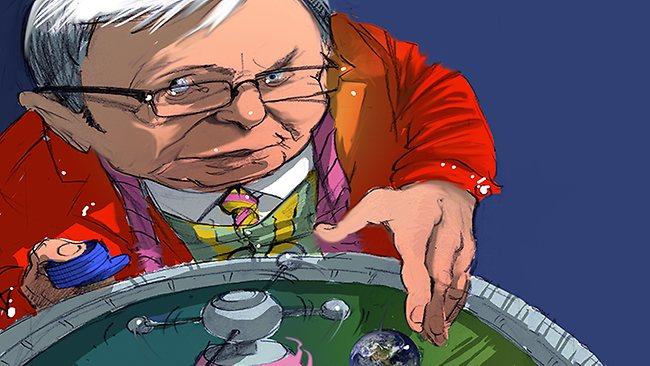
THE carbon tax, it seems, is a good policy that has lost its way. Thank goodness Kevin Rudd is there to set it straight. But far from putting it back on track, he has merely confirmed that under Labor, climate change policy is determined not by rules but by roulette, with the ruler du jour spinning the wheel and choosing the outcome.
Yet Rudd can hardly wash his hands of the existing policy. He voted for it; and at no time did he or any of his ministerial colleagues dissent from even the slightest part of the Clean Energy Future legislation.
So he must take responsibility for its consequences, which include the fact that the average household paid some $300 more in electricity bills than it would have had emissions prices been set from the outset at European levels, that businesses paid $6.5 billion more in taxes and that gross national income was reduced by $3.5bn.
That pointless pain is as much Rudd's as Julia Gillard's. Especially since Rudd's carbon pollution reduction scheme would have imposed costs in its first two years at least $7bn greater than the economic harm Gillard's carbon tax will cause by next July.
However, it is not only the losses for which Rudd must be held accountable; it is also the destruction of what little predictability remained in Labor's scheme.
Rudd well knows the importance of stable policy settings. In 2008 he said, "The government must do everything to deliver business certainty (since) to move to the low pollution economy, a secure investment environment is critical". He further emphasised the point in the CPRS debate, saying "it is in Australia's fundamental national interest to provide business certainty and investment certainty".
And citing Heather Ridout's warning that "uncertainty is death for business", the government, in introducing the CPRS, argued the scheme's stability was indispensable for "low cost compliance" and to allow "investments worth billions of dollars and thousands of new jobs".
The CPRS legislation therefore specified that "the minister will be required to take all reasonable steps to ensure certainty over a five-year horizon at all times", with safeguards, including an independent regulator, to prevent governments tinkering with the scheme's operation. Equally stringent safeguards were built into the CEF, which made changes to the scheme conditional on independent reviews.
But great minds do not concern themselves with procedural trifles, especially when an election looms. That this change completely pre-empts the current Climate Change Authority review can consequently be ignored, just as the CCA was ignored when then climate change minister Greg Combet announced the linkage with the European ETS.
How investors can have any confidence in whatever mechanism Rudd announces next is therefore a mystery worthy of Sherlock Holmes. And adding to the mystery, it is entirely uncertain what remains of the commitments Rudd gave at Copenhagen and which were subsequently detailed at Cancun. Are those commitments being abandoned? If not, how will they be met?
Nor are those questions trivial, for as the price falls, so does the extent of abatement that will occur domestically. If Treasury's modelling is to be believed, once prices get to European levels, achieving the emissions cuts Rudd pledged would require purchasing 80 per cent or more of abatement to 2025 from the European ETS. But even at today's European prices, that entails a transfer of more than $8bn from Australian businesses and consumers to the speculators who bought the emissions permits of bankrupt eastern European producers of coal, iron and steel.
What environmental gain could possibly come from that transfer, which taxes Australians to pay Europeans for emissions cuts they made long ago?
And there will of course be the damage to the budget, with a fall in the carbon price to $10 reducing revenues to 2016-17 by about $14bn. There must be a likelihood that loss will be partially offset by extending the scheme's coverage, further cutting the diesel fuel rebate and slashing the number of free permits. But all of those amount to tax increases, imposing distortions of their own; and with mining and many other industries already reeling, how can those increases be justified?
Ultimately, the only certainty that emerges from this ever-moving fiasco is that the government's climate change policy is anything but a "market mechanism". After all, markets, to work effectively, require meaningful property rights and price signals that allow decision-makers to weigh the costs and benefits of alternative decisions. Having trashed those, the policy has degenerated into a random tax, liable to be changed at each turn of the polls and (through its dependence on the EU carbon price) captive to the follies of European politics.
No doubt, Rudd will brush all these issues aside. No doubt too, as in George Orwell's Nineteen Eighty-Four, new modelling, showing massive gains, will be released; and as in Orwell's Ministry of Plenty, the officials compiling those estimates will comfort themselves with the thought that it is "not even forgery: merely the substitution of one piece of nonsense for another", as the adjustment to "the constantly changing party line" requires updating "statistics that were just as much a fantasy in their original version as in their rectified version".
Long forgotten is "the greatest moral, economic and social challenge of our time". And forgotten with it is the virtue of taking commitments seriously. Instead, all that remains is the truth Peter Garrett blurted out in 2007: "once we get in, we will just change it all." Indeed they have, and indeed they will.



